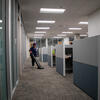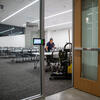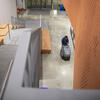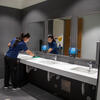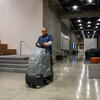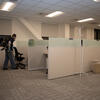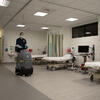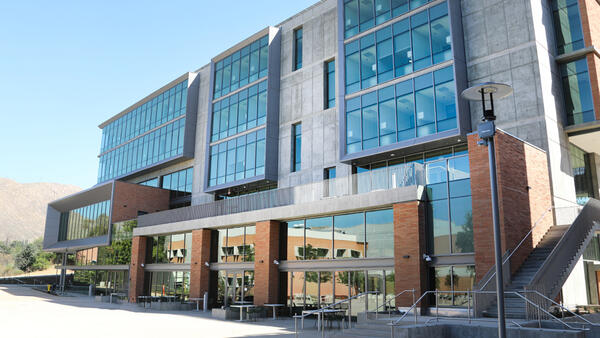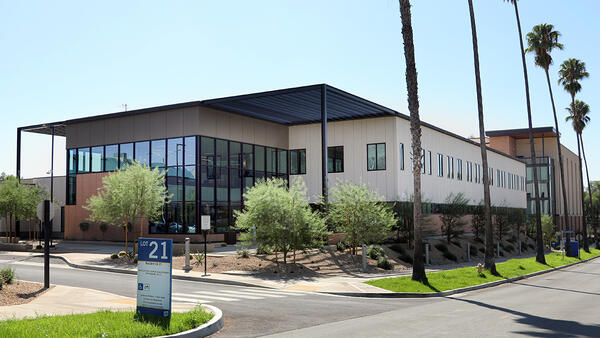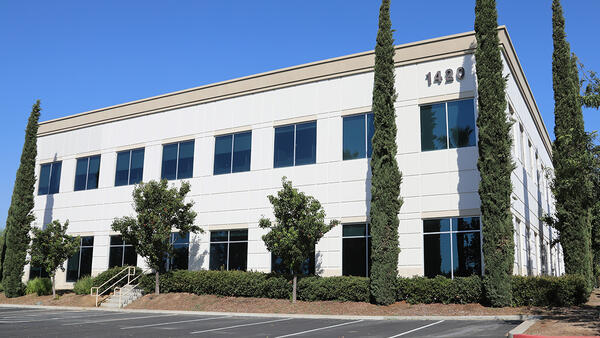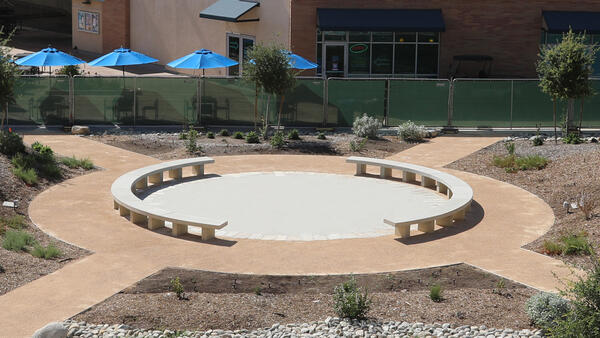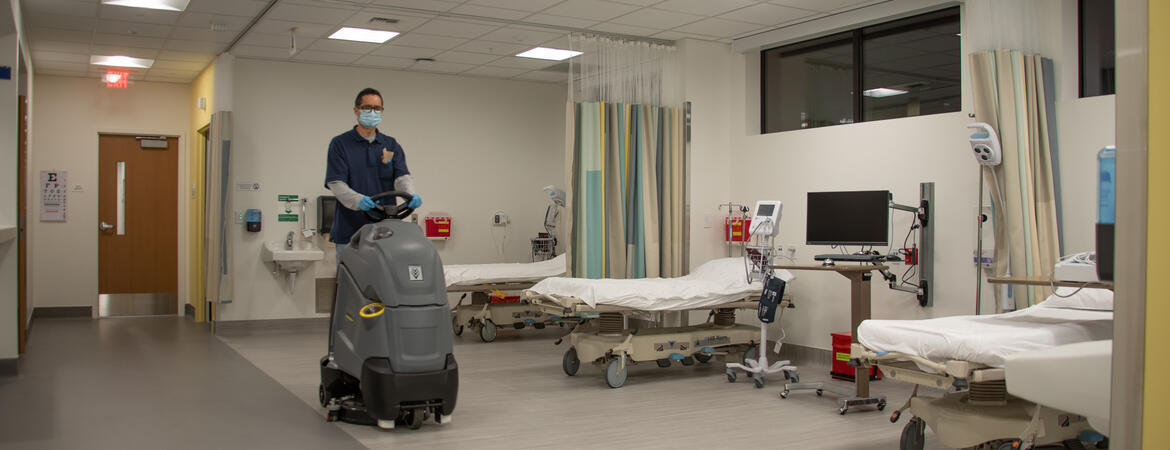
Historically, new buildings have opened one at a time on campus, months apart. In September 2023, three large buildings and a Native American garden were opened, only days apart.
For Facilities Services, a new building means continuous custodial, maintenance, and landscape support. Early participation in the process of selecting architectural finishes, materials, and standardization is vital for maintaining locks, alarms, electrical, plumbing, and cleaning once the building is online.
Ribbon cuttings were scheduled for both the School of Medicine Education Building II and the Student Health and Counseling Center right before the fall session. A purchase of a building on Iowa Avenue concurrently finalized. Trees, plants, and vegetation planted over the spring and summer were ready to unveil at the Native American Garden.
For Aaron Uresti, the assistant director of custodial services and resource management, the biggest challenge was everything occurring all at once. He calculated the numbers in square feet.
“This is 160,000 square feet of cleanable space we literally had to start at the same time. We have about three million square feet, and we added this space; it’s a five percent increase. That’s a lot of space,” Uresti said.
He has seven new hires on the way to work in the buildings. It is the largest group of custodians he has hired in the last three years.
A positive is that most of the finishes in the buildings are low maintenance for cleaning due to Uresti’s participation in the design process. The newer finishes selected are easier to maintain, so his team does not have to regularly wax the floors.
However, the openings required FS’s access control shop to work three consecutive, mandatory weekends. Chris Rodriguez, the access control lead, and locksmiths Mathew Faraimo, Frank Lam, and Dennis Ritchey successfully brought the buildings online.
Working weekends was the only way they could keep up with their regular workload. “It was a really tough time for that shop,” their supervisor, Ben Kochevar said.
School of Medicine Education Building II
Rodriguez was tapped to implement card access for the building occupants of SOM ED II. He constructed workarounds and submitted the information to ITS for distribution so the building could open on time.
The electric shop worked with the design contractor to determine electrical issues with the building’s exterior lighting, which was affecting another building.
FS partnered to designate community waste, recycling, and composting bins at SOM ED II to uphold UCR’s Zero Waste initiatives. The bins are collected on a regular cleaning schedule.
Student Health and Counseling Center
Student Health is the first building to entirely use the R’Card for access control. Rodriguez worked with all 380 users to establish an access hierarchy and create a complex matrix. Over a weekend, he and the access control team brought the full system online and implemented the access.
Marc Santoro, a fire and life safety technician, was tapped to assist with the fire alarm system. He successfully resolved a systems communication issue, which was preventing the building from going online, in time for the grand opening.
Jeff Coppage, a fire and life safety mechanic, was also tapped to assist with bringing the security alarms and panic alarms online.
In the handover, Tos Ishida, assistant director of landscape, refuse, and recycling services, noticed potted plants without drainage at the front entryway. “Sometimes we have to roll with the punches,” he said. He will have his irrigation team add drainage to cease moss from growing. The building’s terrain also has a slope, which will require careful landscaping.
1420 Iowa Avenue
When the Iowa Avenue building went into escrow, all its service vendor contracts were canceled by the owner. This left a gap in service during the time the building was sold.
Since occupants were in the building, FS had to quickly understand the facilities needs and manage allocating time and resources to support the property.
“We had to play catch up,” Uresti said. “We had to temporarily adjust our schedules to meet the needs of the building. Initially we didn’t have full access, so our custodial night crew had to go in during regular business hours and clean.”
All gas, water, and electric utilities had to be switched over to UCR by FS’s purchasing team and they worked quickly to coordinate contract service work.
Ishida’s landscape team followed. They swept the parking lot, set up refuse service, and conducted landscape work.
“We had to do an assessment of the property and come up with a game plan and new labor. Sometimes it is challenging if there is a break. Right now, we’re doing our own research. We’re going out to every valve and investigating. We couldn’t get as-builts of the property,” Ishida said.
FS’s access control and fire and life safety teams began examining how to bring the fire alarm, security alarm, and card access systems online.
Rodriguez worked with Lam to rekey two entire suites to provide occupants with immediate access.
In a day, Rodriguez and Coppage removed the old access system and installed a standard campus access system. It is set to lock and unlock daily. They met with all tenants to setup their fobs.
The offline fire alarms and security alarms required a fire watch state. Through Labor Day weekend, all fire and life safety technicians, including Coppage, Santoro, and John Kendrick, tag teamed a fire watch for 24 hours a day, over seven days. It took this time to order the parts.
When the parts for the alarms arrived, the fire and life safety team worked a 12-hour day installing it to end the fire watch for that evening.
Dan Lerman, the project manager of FS’s project management team, is currently overseeing minor renovations to prepare space for new tenants this month. This includes painting, floor covering, and other necessary maintenance repairs.
Electricians Joey Tovar and Darrin Fox have been working on the electrical infrastructure for the cubicles.
Native American Garden
FS’s landscape team was included in the planning of the Native American Garden before the COVID-19 pandemic. They provided input on the plant material selected by the project committee.
Each tree, plant, and vegetation have significant meaning for the project.
“Most of the plant material had to be specially grown. Our hardest part is maintaining it because some of it is very delicate,” Ishida said. Diversity of plant and species is key to maintaining the area.
During the summertime, some of the species will become dormant. “We have to make sure we are taking care of it so it matches the environment. It’s unique,” he said.
Mark Jones, the campus arborist and an irrigation and landscape supervisor, manages all of the plant reviews with Ishida on new construction projects.
The campus is leaning towards more drought tolerant landscaping. It is good for savings, but drip maintenance requires more labor.
FS’s sign shop and sheet metal shop are resurrecting signage posts with a QR code for visitors to learn more about the project. The plumbing and electrical shops will assist by reviewing the grounds for any utilities before digging.
